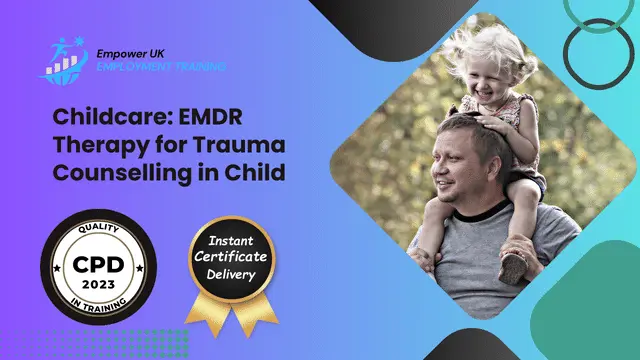
Childcare: EMDR Therapy for Trauma Counselling in Child
Level 3 Diploma | 100% Pass Rate | Assignment Included in Course Price | Free Certificate | Lifetime Course Access
Empower UK Employment Training
Summary
- Reed Courses Certificate of Completion - Free
- Tutor is available to students
Add to basket or enquire
Overview
Childcare: EMDR Therapy for Trauma Counselling in Child
Embark on a specialized journey in Child Care with our course on EMDR Therapy for Trauma Counselling in Children. This course is designed to provide an in-depth understanding of Eye Movement Desensitization and Reprocessing (EMDR) Therapy and its application in Child Care, focusing on helping children overcome trauma.
Learning Outcomes:
- Understand the principles and application of Reprocessing (EMDR) Therapy in Child Care.
- Learn the nuances of Child-Centered EMDR and its significance in Child Care.
- Master the EMDR 8-Phase Protocol tailored for Child Care settings.
- Acquire skills in implementing Desensitization techniques in Child-Centered EMDR within Child Care.
- Learn the process of achieving Closure in Child-Centered EMDR sessions.
Key Employment Opportunities:
- Child Caregivers
- Child Care Facility Administrators
More Benefits:
- Assignment Feedback on Child Care
- Free Digital Reed Certificate on Childcare: EMDR Therapy for Trauma Counselling in Child
- Compatible with iPhone & Android Devices
- Moneyback Guarantee
Curriculum
Course media
Description
Key Modules from Childcare: EMDR Therapy for Trauma Counselling in Child:
Reprocessing (EMDR) Therapy: Delve into the basics of EMDR Therapy, understanding how it is used to treat trauma in children.
Child-Centered EMDR: Learn about adapting EMDR therapy specifically for children, focusing on their unique needs and developmental stages.
EMDR 8-Phase Protocol: Study the structured approach of the EMDR 8-Phase Protocol and its effectiveness in Child Care.
Desensitization in CC-EMDR: Explore the desensitization phase in Child-Centered EMDR, focusing on reducing the emotional impact of traumatic memories in children.
Closure in CC-EMDR: Understand the strategies for achieving closure in EMDR therapy sessions, ensuring a sense of safety and completion for the child.
Other Key Modules of This Childcare: EMDR Therapy for Trauma Counselling in Child Include:
- Stabilization in CC-EMDR
- Re-evaluation in CC-EMDR
- And, Many More …
Who is this course for?
This Childcare: EMDR Therapy for Trauma Counselling in Child Program is designed for anyone keen on mastering Child Care skills. This course is particularly useful for:
- Child Caregivers
- Child Care Facility Administrators
This Childcare: EMDR Therapy for Trauma Counselling in Child will also help you if you choose to further progress your career in the following courses:
- Level 2 Diploma in Child Care
- Level 3 Diploma in Child Care
- Level 3 Certificate in Child Care
- Level 5 Diploma in Child Care Management
- Level 7 Diploma in Child Care Management
- Level 1 Diploma in Child Care and Education
- Level 2 Diploma in Child Care and Education
- Level 3 Diploma in Child Care and Education
- Level 1 Diploma in Child Care and Education
- Level 2 Diploma in Child Care and Education
- Level 3 Diploma in Child Care and Education
- Level 1 Certificate in Child Care and Education
- Level 1 Certificate in Child Care and Education
- Level 2 Certificate in Child Care and Education
- Level 2 Certificate in Child Care and Education
- Level 3 Certificate in Child Care and Education
- Level 3 Certificate in Child Care and Education
Requirements
This Childcare: EMDR Therapy for Trauma Counselling in Child is open to all.
Career path
- Residential Child Care Worker
- Child Care Assistant
- Child Care Solicitor
- Child Care Assessor
- Child Care Worker
- Child Care Centre Manager
Questions and answers
Currently there are no Q&As for this course. Be the first to ask a question.
Certificates
Reed Courses Certificate of Completion
Digital certificate - Included
Will be downloadable when all lectures have been completed.
Reviews
Currently there are no reviews for this course. Be the first to leave a review.
Legal information
This course is advertised on reed.co.uk by the Course Provider, whose terms and conditions apply. Purchases are made directly from the Course Provider, and as such, content and materials are supplied by the Course Provider directly. Reed is acting as agent and not reseller in relation to this course. Reed's only responsibility is to facilitate your payment for the course. It is your responsibility to review and agree to the Course Provider's terms and conditions and satisfy yourself as to the suitability of the course you intend to purchase. Reed will not have any responsibility for the content of the course and/or associated materials.


